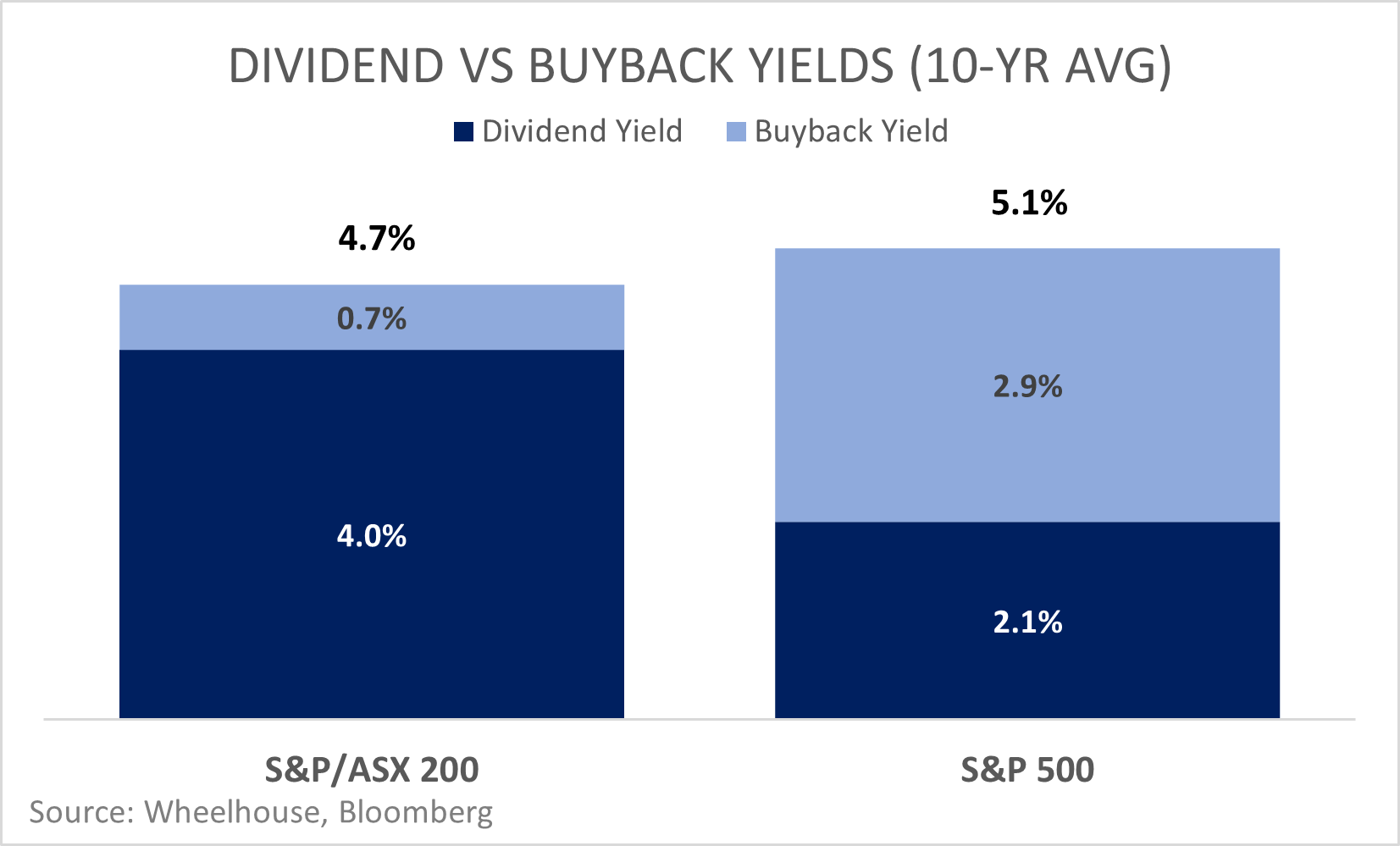US dividends may get a boost from Biden tax plan
US shares have rarely been high on an income investor's wishlist, with average dividend yields for the S&P 500 Index meaningfully trailing the ASX 200 Index and other markets for decades. However, US companies are no less cash generative. Instead, share buybacks have been the primary mechanism for 'returning' cash to shareholders. When buybacks are included, US shares have consistently 'yielded' higher than Australian shares.
With the Biden Administration's proposed changes to capital gains taxation underfoot, this may spark a rethink amongst US corporates regarding dividend policy.

Tax policy matters
Just as we saw in Australia ahead of the 2019 Federal election with the avalanche of fully franked bumper dividends, tax policy can have a meaningful impact on dividend payouts.
Under the proposed Biden tax plan, the Federal taxation rate on capital gains (for taxpayers earning more than $1mm) would increase from 20% to 39.6%. This contrasts with the current dividend rate for the top tax bracket of 20%.
Faced with a near 40% tax on capital gains, versus a 20% tax on dividends, we believe US corporates may re-evaluate their capital allocation policies and lean away from share buybacks (which flow into capital gains), favouring increased dividend-based payments.
How much does taxation policy affect dividend payouts?
The last time there was a major change to dividend taxation policy was in 2003 when the 'Bush tax cuts' were passed by Congress.
Prior to 2003, the taxation regime was heavily biased against dividends, with US companies paying a 35% corporate tax rate, and then shareholders paying up to an additional 35% personal tax rate on dividends they received. This effective double taxation of dividends explains why dividend payments fell out of favour in the 1980s and 1990s.
The centerpiece of the Bush tax cuts was a cut in the dividend tax rate to 15%, with low-income families only paying 5%. This had a major impact on dividend payouts in subsequent years. (nb, the rate was subsequently increased to 20% by President Obama in 2013).
In a Cato Institute study from 2004 which analysed the impact of the tax change on dividend payments, reseachers found that dividend payments (including specials) for stocks within the S&P 500 Index increased 23% in 2004, the year after the tax changes came into effect.
Furthermore, the number of companies paying dividends also increased, with 22 new companies commencing a regular dividend payment. Notably Microsoft, which had never paid a dividend before 2003, announced a major special dividend and commenced a regular dividend payment.
These trends are consistent with a study prepared for the Federal Reserve which looked at a broader universe of the S&P 1500 (below):
Buybacks vs dividends
In recent years share buybacks in the US, particularly from the tech sector, have been the primary source of returned capital to shareholders and helped underpin a portion of the significant capital gains seen by the entire market. Should the proposed Biden tax changes come into effect, we believe US corporates may re-evaluate the relative merits of dividends, providing a potential tailwind for dividends in future years.
From an investor's perspective, we believe this may be a very good thing. On average, share repurchases have proven historically to be highly pro-cyclical, meaning more shares are often bought when prices are high than when prices are low. Repurchase plans are often halted during periods of market stress, only to be re-started once prices have recovered. This can be extremely value destructive if the timing is all wrong.
With dividends, the earnings of the company are safely transferred into the pockets of investors who rely on income. These investors will likely have far more personally important capital allocation decisions to make (such as food and housing), versus ploughing more money back into the stock market when it is at record levels.
At
Wheelhouse, our Global fund is well exposed to any increase in US dividends. While
dividends only make up a small fraction of our Global funds 7-8% yield, any
increase in dividend yields would be fully captured via the fund's Buywrite
strategy.
(1) Stephen Moore & Phil Kerpen, Show me the Money! Dividend Payouts after the Bush Tax Cut (Cato Institute, 2004)
Never miss an insight
Enjoy this wire? Hit the ‘like’ button to let us know. Stay up to date with my content by hitting the ‘follow’ button below and you’ll be notified every time I post a wire. Not already a Livewire member? Sign up today to get free access to investment ideas and strategies from Australia’s leading investors.
3 topics

